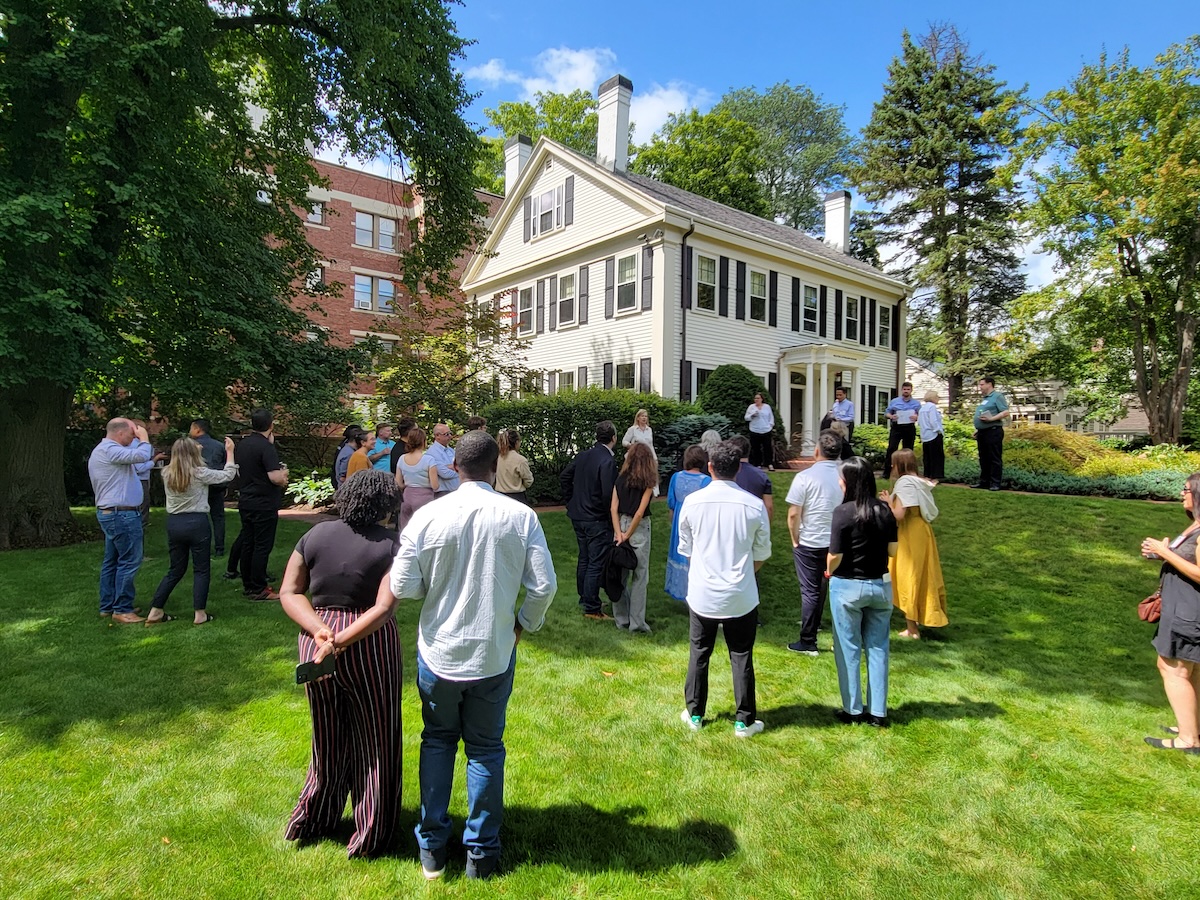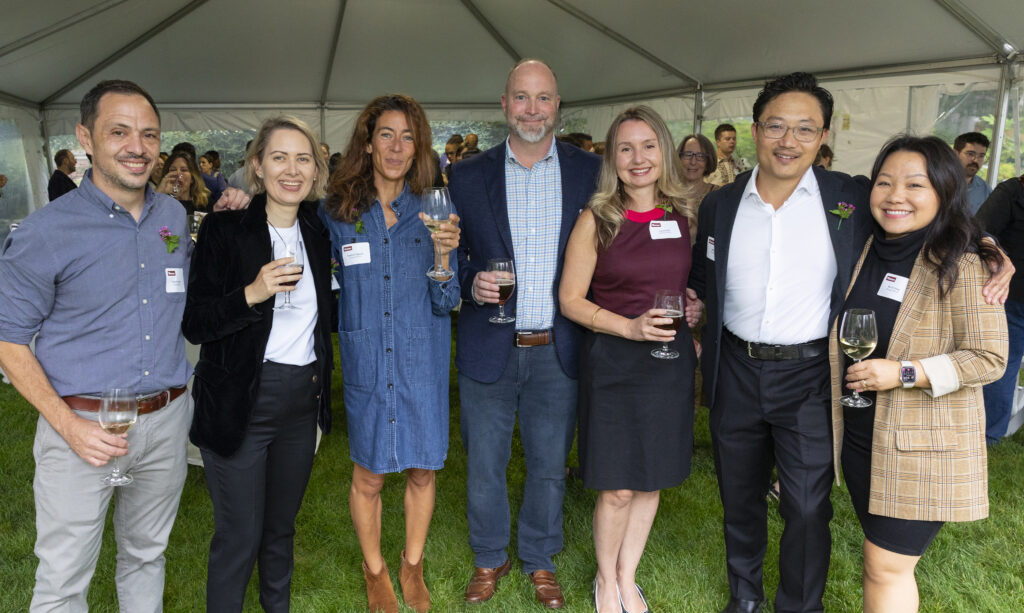
A Year of Disruption
Global events including ongoing wars, pivotal national elections and rapidly evolving AI technologies challenged newsrooms, democracy and higher education in startling new ways during 2024. But the year also brought new opportunities for journalists to serve their audiences by continuing to tell stories that matter, counter misinformation with facts and collaborate on important investigations.
The year dawned with Harvard at the center of national and international attention connected to the events that led to the Jan. 2 resignation of President Claudine Gay, just three months after her inauguration. Gay stepped down following sustained criticism of the university’s response to the October 2023 Hamas attack on Israel and related protests on campus, her testimony during a contentious congressional hearing in Washington and assaults on her own scholarly research. The news shook the Harvard community and raised daunting questions about free speech, dissent, political and donor influence in academia and polarization in all sectors of society.
University Provost Alan Garber quickly took over as interim president and in August was named Harvard president through the 2026-2027 academic year. In a statement, he acknowledged the difficulties of the past year, and in a Harvard Gazette interview said: “It is incumbent upon us to set norms and to foster a culture of curiosity and inquiry in which the discovery and dissemination of truth thrive. Knowing that such fundamental changes take time adds to the urgency of our task.”
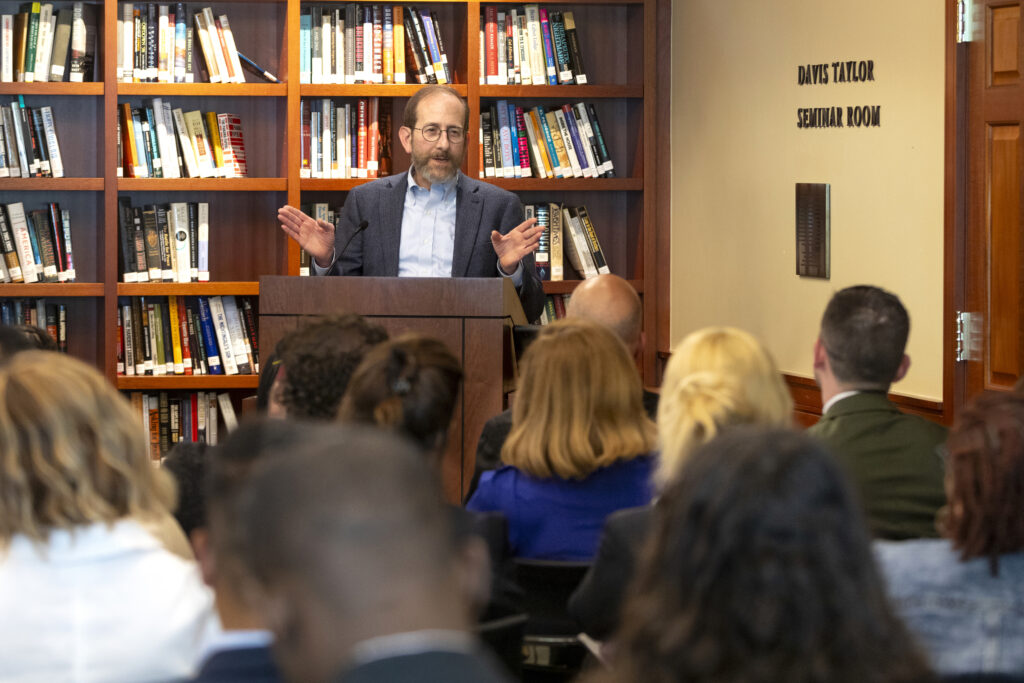
Nieman Fellows in the class of 2024 witnessed the debates swirling around dissent, intolerance and political interference in education firsthand. Several faculty members met with them during the spring term to explore those issues and discuss the implications for the future.
Supporting Student Journalism
In April, we celebrated the 20th anniversary of the Christopher J. Georges Conference on College Journalism. This annual event welcomes student journalists from across the country to network and learn.

The conference has gained new urgency in recent years as many college newspapers step up to fill the gap left by the nation’s shrinking local media. We invited nearly 100 students from 36 schools, as well as 11 student newsroom advisors, to the two-day event at the American Academy of Arts and Sciences. It was our largest Georges Conference ever. We’re deeply grateful to the Georges family for its unfailing support of the conference, and to our friends at The Harvard Crimson for their ongoing partnership in hosting the event.
Niemans in Peril
As the harrowing death toll of journalists killed in the Israel-Hamas war rose throughout the year (CPJ reported in December 2024 that at least 141 journalists and media workers have been killed since Oct. 7, 2023, and 133 of them were Palestinians in Gaza), attention grew about the mortal dangers of the profession. With the August release of journalists Evan Gershkovich and Alsu Kurmasheva from jail in Russia in a historic prisoner swap, the world was reminded of the risks journalists too often face on the job.
In July, Nieman joined dozens of leading media and civil society organizations around the world that signed an open letter urging Israel to give journalists independent access to Gaza in response to the high number of journalists killed since the start of the war.
And in August, Nieman and other free press advocates denounced Georgia’s restrictive new Russian-style foreign agent law and pledged support for Georgian journalists who face state-organized trolling, intimidation tactics and a political effort to silence them. We have learned more about the impact of the Georgian law from 2025 Nieman Fellow Lasha Kveseladze, an investigative journalist for the Mtavari Channel and co-founder of the Journalistic Data Processing Centre in Tbilisi.

At Lippmann House, we’re especially concerned whenever members of the Nieman family are in peril, as several currently are:
- As we reported in April, Peruvian journalist Gustavo Gorriti, NF ’86, one of Latin America’s leading investigative reporters and founder of the influential IDL-Reporteros newsroom, is facing an ongoing smear campaign designed to discredit his work exposing corruption. The Committee to Protect Journalists, Reporters Without Borders, The National Press Club and other journalism groups have rallied behind him and a number of Nieman Fellows signed an open letter organized to show support for his work.
- Truong Huy San, NF ’13, widely known by his pen name Huy Duc and one of Vietnam’s most influential journalists, was arrested on June 1 in Hanoi for comments posted online. He has been charged with “abusing democratic freedoms” under an article of the penal code often used to silence critics of the government, part of a wider crackdown on dissent. Nieman has joined numerous journalism organizations in calling for San’s immediate release and for the charges against him to be dismissed, and we have appealed to diplomatic sources for their help. Peter Zinoman, professor of history and Southeast Asian studies at UC Berkeley, has published an English translation of an interview he conducted with San at the end of his Nieman year in the Journal of Vietnamese Studies.
- In November, 2007 Nieman Fellow Dong Yuyu, already jailed in China on baseless espionage charges, was sentenced to seven years in prison. U.S. Ambassador to China Nicholas Burns condemned the verdict, posting on X: “Punishing Dong for exercising his freedom of speech and the press, guaranteed by the PRC’s constitution for all its citizens, is unjust.” Others, including the Committee to Protect Journalists, have called for his immediate release. Dong was detained on Feb. 21, 2022, while having lunch with a Japanese diplomat at a hotel in Beijing. His son Yifu, his Nieman classmate Ian Johnson and 2007 Nieman affiliate Bill McCarren are among those who continue to advocate for Dong and have reached out to U.S. government officials and members of Congress to find ways to raise awareness of his case in China. Nieman joins them in seeking ways to help win Dong’s freedom.
- Masha Gessen, NF ’04, author, opinion columnist for The New York Times and the first Distinguished Professor at the Craig Newmark Graduate School of Journalism at CUNY, was sentenced in absentia in July by a Russian court to eight years in prison. Moscow-born Gessen, who lives in the U.S., has been charged with “spreading false information” for commenting on the Russian military’s alleged atrocities in the Ukrainian city of Bucha in 2022. Gessen had been placed on a wanted list by Russia’s Interior Ministry in December 2023.
- The investigative news program “War Zone” hosted by Raviv Drucker, NF ’03, on Israel’s Channel 13, has been taken off the air. While News 13 has denied any political agenda, many viewed the move as a reflection of the growing pressure on the media in Israel and the silencing of critical voices by Prime Minister Benjamin Netanyahu’s government. Drucker has reported on powerful figures including Netanyahu and Israeli Transportation Minister Miri Regev.
The common denominator in these cases is a government intent on silencing reporting that speaks truth to power. We remain committed to supporting all imperiled journalists by working to publicize their stories, appealing to U.S. officials to make stronger and louder claims for press freedom globally, and joining with other concerned organizations working on their behalf. We will continue to advocate for Nieman Fellows around the globe, as Nieman Curator Ann Marie Lipinski outlined in an August column for Nieman Reports.
In the fall, we welcomed the Nieman class of 2025. We explored the question “Where’s home?” For some of the fellows the answer was plain; for others, harsh political realities mean that home is no longer safe, and work is now done in exile.
The 2024 U.S. presidential election
Against the backdrop of the closely watched U.S. presidential race, the 2025 Nieman Fellows arrived on a campus this fall where they met with professors, pollsters and pundits all eager to analyze electoral politics and coverage of the candidates.
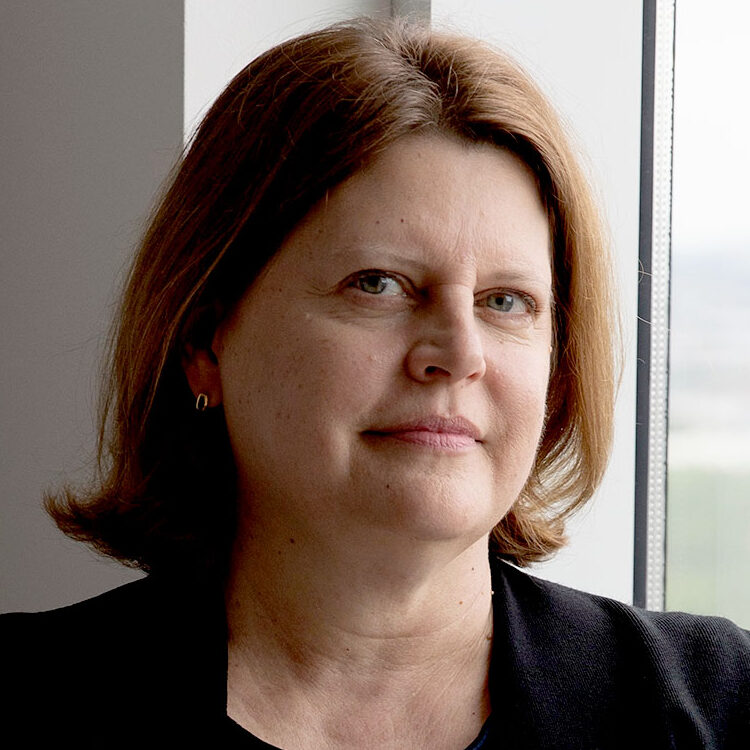
Adding to the many campus resources that explain this election, Sally Buzbee, former executive editor of The Washington Post and The Associated Press, joined Nieman this fall as a visiting fellow to help us take a deeper look at political journalism and its role in democracy. She offered valuable insights about election coverage and electoral polling in talks at Nieman and on campus and reflected on the role of a free press in holding the powerful to account through the electoral process.

Among her many activities, Buzbee moderated a talk for the fellows with John Anzalone, chief pollster for President Biden in 2020 and a Resident Fellow at Harvard Kennedy School’s Institute of Politics, who spoke about polling in political campaigns. She also moderated a thought-provoking pre-election Nieman-to-Nieman conversation with Deborah Barfield Berry, NF ’23, national correspondent for USA Today; Amanda Becker, NF ’23, Washington correspondent for The 19th; and Lisa Lerer, NF ’18, national political correspondent for The New York Times.
Gauging the future of press freedom
With the election of Donald Trump as U.S. president in November, the American press faces ominous new threats from an administration that promises to be openly hostile to journalists.
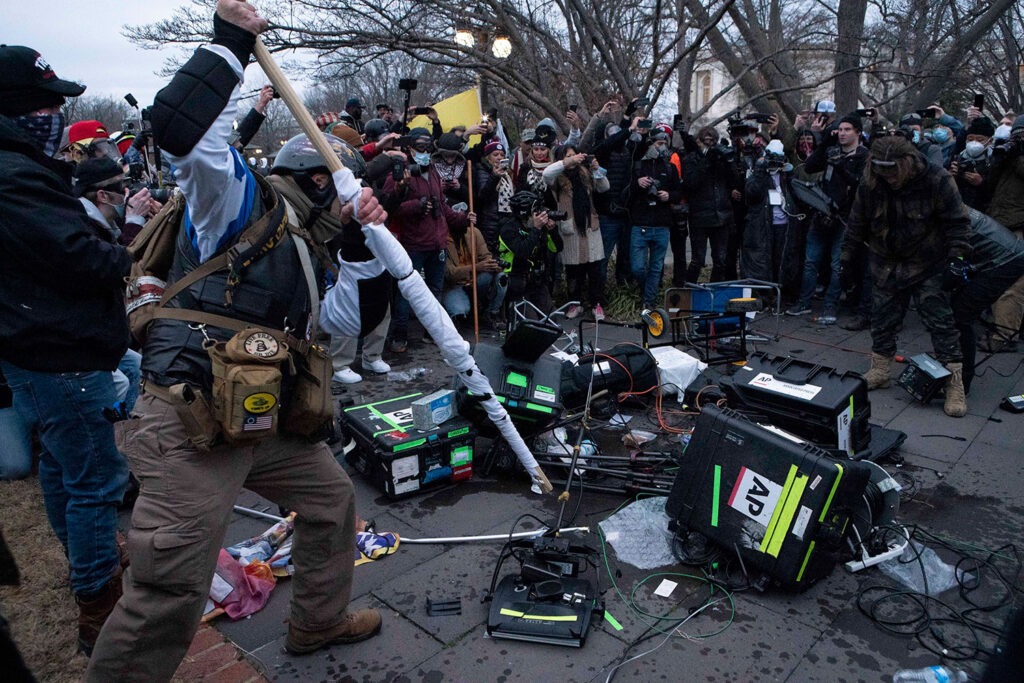
For the Fall 2024 Nieman Reports cover package, “Dear America,” we asked nine colleagues living in democracies where press freedom has been eroded to share their experiences and offer advice on how to cope with possible restrictions on journalists. Writing from Hungary, the Philippines, Peru, Ghana, India, Poland, Ecuador, Turkey and Zimbabwe, they offer not only warnings – “prepare for the worst” – and sobering practical tips –“know your rights, seek allies, take security precautions, have an emergency protocol in place and start a legal fund” – but also a road map for the future, encouraging all of us to stay strong and “yield not an inch.”
As we look ahead to a new year, Nieman remains committed to monitoring and reporting on the issues that matter most to journalists and the media world in our three publications, Nieman Lab, Nieman Reports and Nieman Storyboard.
- To learn more about the many topics and news stories we covered in 2024, visit our Publications page.
- For more information about Nieman news, publications and programming, subscribe to our newsletters and follow us on all our social media channels – including our new accounts on Bluesky (Nieman Foundation, Nieman Reports, Nieman Lab and Nieman Storyboard).
Staff News
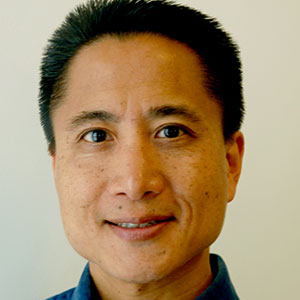
In July, we welcomed Henry Chu, NF ’15, back to Lippmann House as Nieman’s new deputy curator. An accomplished journalist who spent most of his career at the Los Angeles Times, Chu started his career as a local reporter in L.A. before joining the foreign staff and undertaking bureau postings that took him to 30 countries. His experience as both a Harvard College undergraduate and a Nieman Fellow give him valuable insight into the university’s many resources and possibilities.
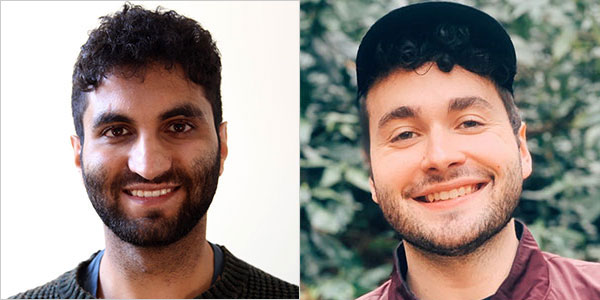
With a generous gift in support of Nieman Lab reporting, we hired two new staff writers, Andrew Deck and Neel Dhanesha, in March. Deck covers the intersection of generative AI and journalism and previously was a staff reporter at Rest of World, an international nonprofit publication he helped launch to chronicle the impact of technology in non-Western countries. Dhanesha is a writer and audio producer from Bangalore, India. He was a founding staff writer at the climate news startup Heatmap and has been a reporter at Vox, a fellow at Audubon magazine and an assistant producer at Radiolab.
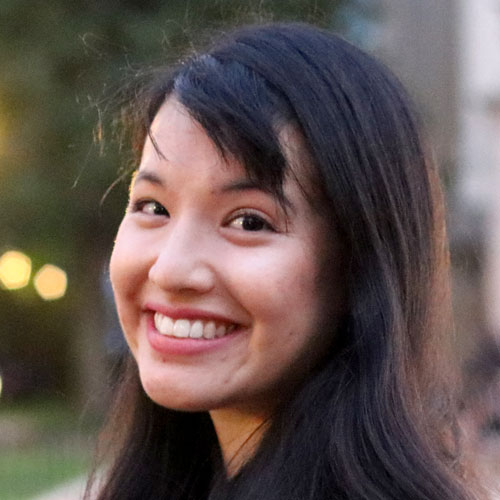
Megan Cattel joined us as the new assistant editor of Nieman Reports at the beginning of the year. Cattel supported our audience engagement efforts as a freelancer last year and previously worked as a freelance digital and audio producer for WBUR; a researcher and fact-checker for StoryCorps; a podcast producer for Foreign Policy; and a reporting intern for both St. Louis Public Radio and the Center for Public Integrity.
Nieman’s annual journalism awards honor exceptional reporting in several categories. In May, we hosted an awards ceremony that honored this year’s winners of the Bingham Prize for Investigative Journalism, the Taylor Family Award for Fairness in Journalism and the I.F. Stone Medal for Journalistic Independence. It was an inspirational gathering of reporters doing extraordinary work that exposed and righted serious wrongs and spurred significant reforms in their communities.
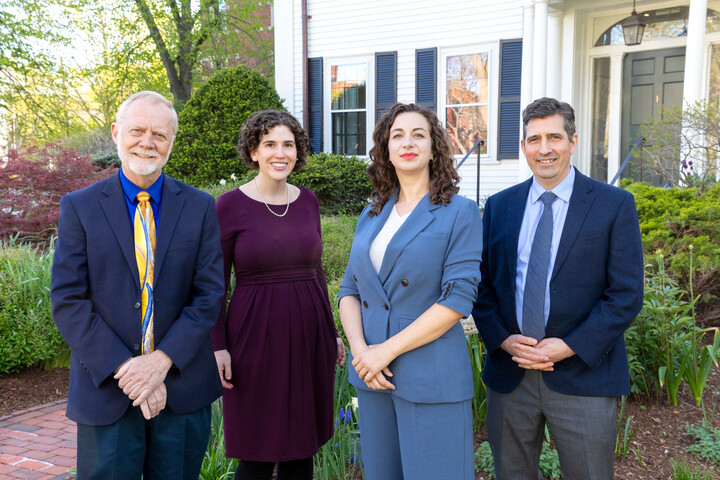
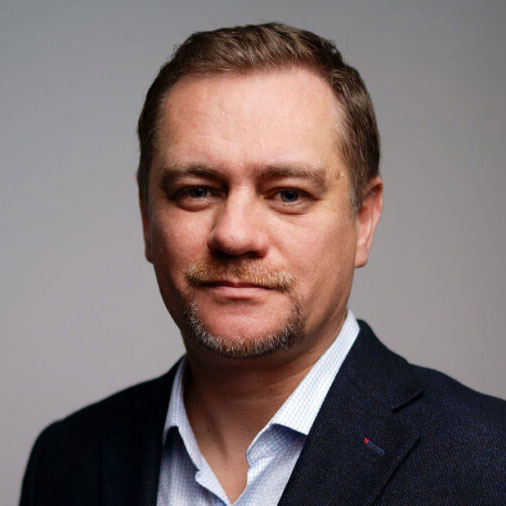
We’re grateful to the judges who deliberated to select the winners and finalists of our awards, including judges for the 2024 Lukas Prize Project awards – presented in partnership with Columbia Journalism School – as well as the 2024 Nieman Fellows, who selected Ukrainian investigative reporter Yuriy Nikolov, co-founder of the investigative media project Nashi Groshi, as winner of the 2024 Louis M. Lyons Award for Conscience and Integrity in Journalism.
Announcing the award, the 2024 Fellows said: “Nikolov’s high-profile corruption investigations into alleged graft in the Ukrainian military shine a light on the importance of watchdog reporting even in the most dire of circumstances. At great personal and reputational risk, Nikolov’s reporting has asked for accountability in the use of public funds, even while his country continues to fight Russia’s invasion.”
Learning of his award, Nikolov spoke of the importance of the prize to journalists throughout his country, where mounting security and economic challenges have been crippling, and in a prepared statement for the fellows, he described the daunting challenges of covering corruption in a country at war. Our extensive coverage of reporting in and about Ukraine can be found in Nieman Reports, Nieman Lab and Nieman Storyboard.
Learn more about Nieman’s 2024 journalism award winners on our Journalism Awards page.
In memoriam
With gratitude, we remember members of the Nieman family we lost during the past year and their many contributions to journalism.
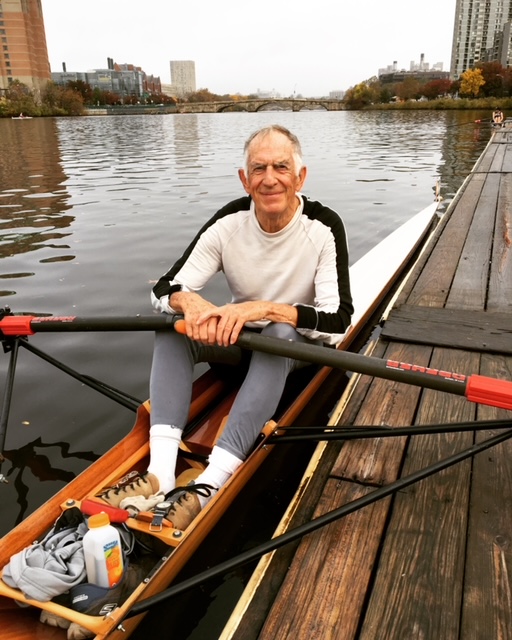
Nicholas Daniloff, NF ’74, who reported from the Soviet Union for both UPI and U.S. News & World Report, died on Oct. 17, 2024, in Cambridge, Mass. He was 89. In 1986, Daniloff was falsely accused of espionage in Moscow and jailed for two weeks before he was exchanged for a Soviet spy who had been arrested in New York. Daniloff credited U.S. President Ronald Reagan for helping to win his release. During his career, Daniloff reported for UPI from London, Geneva, Moscow and Washington, D.C. In 1980, he joined U.S. News & World Report and became Moscow bureau chief. Daniloff also taught journalism at Northeastern University.
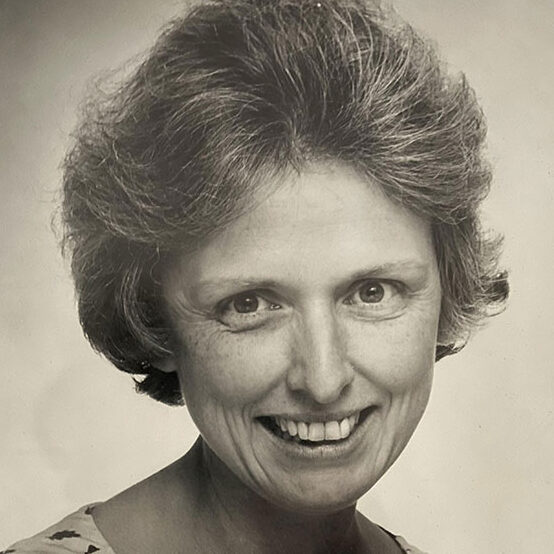
Judith Havemann, NF ’80, a longtime Washington Post reporter and editor, died on July 28, 2024, at her home in Washington, D.C. During more than three decades at the Post, Havemann worked in numerous roles including deputy national editor, chief newsroom recruiter and editor of the Food section. She also was a contributor from Europe in the 1990s, while her husband, Joel Havemann, was a foreign correspondent for the Los Angeles Times. After taking a buyout from the Post in 2006, she worked as an editor for the Wilson Quarterly, was the public relations director for the National Endowment for the Humanities and taught journalism at the University of Maryland. Two of her 1980 Nieman classmates, Lynda McDonnell and Judy Stoia, shared their memories of her life and work.
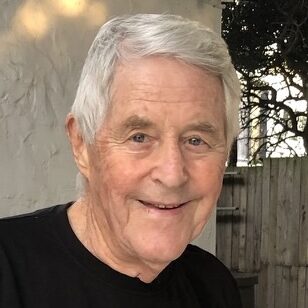
Tony Heard, NF ’88, the former editor of the Cape Times in South Africa, died in Cape Town on March 27, 2024, at the age of 86. In 1985, when apartheid-era regulations forbade the media from quoting leaders of the African National Congress, Heard famously went to London to interview Oliver Tambo, the ANC’s then-banned and -exiled leader. Heard published his interview in full, offering readers the unfiltered views of one of the most important liberation leaders in South Africa. That coverage led to Heard’s arrest, and he was charged under the Internal Security Act for quoting a banned person, an offense that carried a prison sentence of three to 10 years. After the democratic transition in his country, he worked for the Mandela and Mbeki administrations. In a statement, his family, including daughter Janet Heard, a 2010 Nieman Fellow, noted: “Tony was a fiercely independent thinker who has left an indelible footprint in journalism and beyond, with a lifelong commitment to non-racialism, media freedom and social justice.”
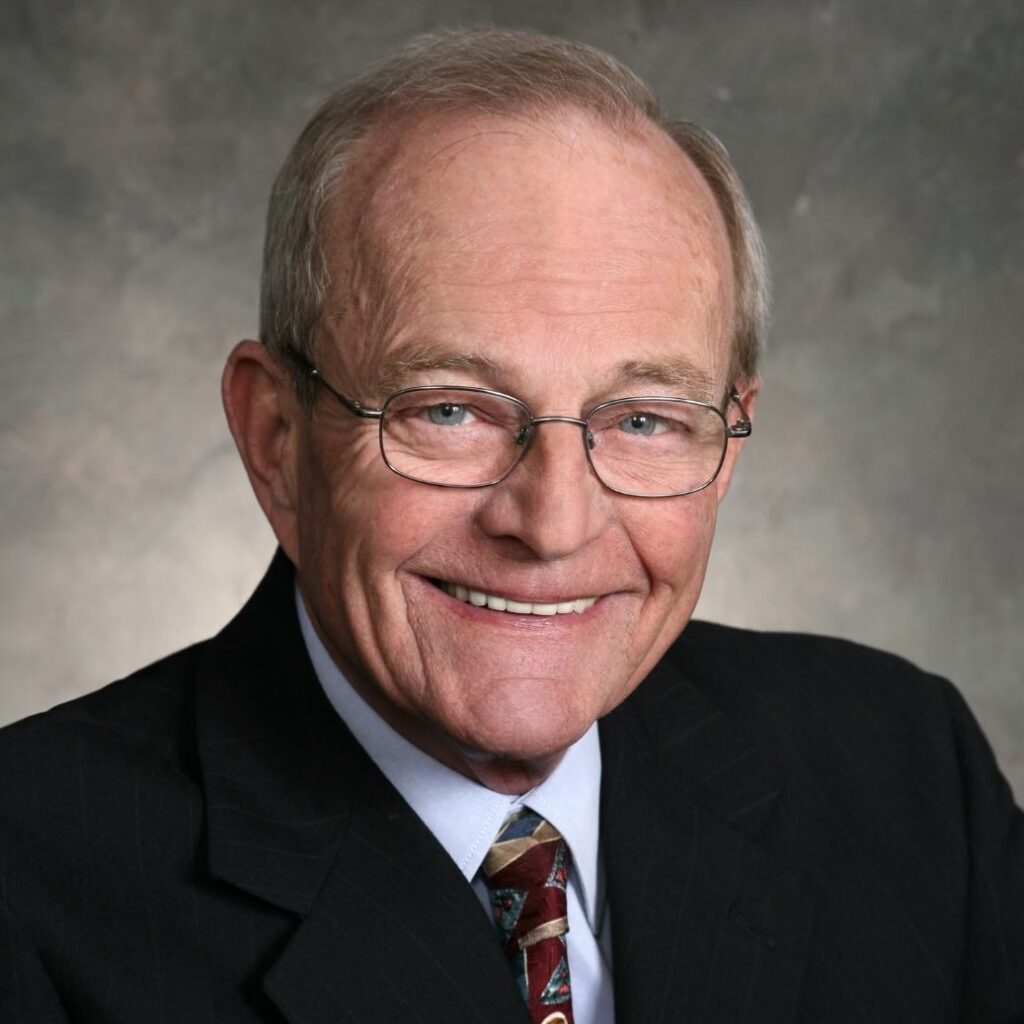
Bill Meek, NF ’67, a longtime journalist and public relations leader, died on March 25, 2024, at the age of 88. Early in his career, he reported for the Bergen Evening Record in New Jersey before joining the army and moving to Arizona. After being discharged in 1961, he joined The Arizona Republic, where he covered political, environmental and health care issues and won multiple awards for investigative journalism. Meek was selected as the first Arizona Press Club’s “Newsman of the Year” in 1969. From 1920-72, Meek served as a special assistant to Mayor John Driggs in Phoenix before taking a job as Lansing bureau chief for the Detroit Free Press. He returned to Phoenix in 1975 where he served as communications director for Arizona Public Service Company. He also started several public relations firms.
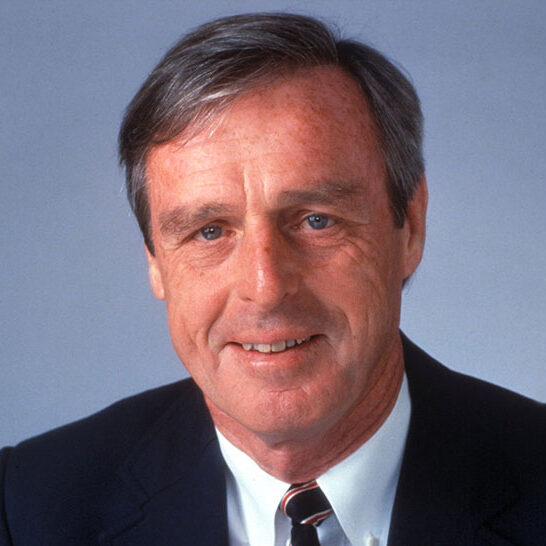
Reg Murphy, a 1960 Nieman Fellow, who worked as an editor and publisher at newspapers across the country, died on Nov. 9, 2024, at his home in St. Simons Island, Georgia. He was 90 years old. Murphy worked as an editor at The Atlanta Constitution and was publisher for both the San Francisco Examiner and The Baltimore Sun. He additionally served as president and CEO of the National Geographic Society from 1996-1998. Murphy survived a politically motivated kidnapping in 1974 when he was the editorial page editor for The Atlanta Constitution. He was released after two days when the paper paid a $700,000 ransom. Murphy was a member of the Board of Trustees at Mercer University, his alma mater, and in 2023, the school renamed its journalism center in his honor.
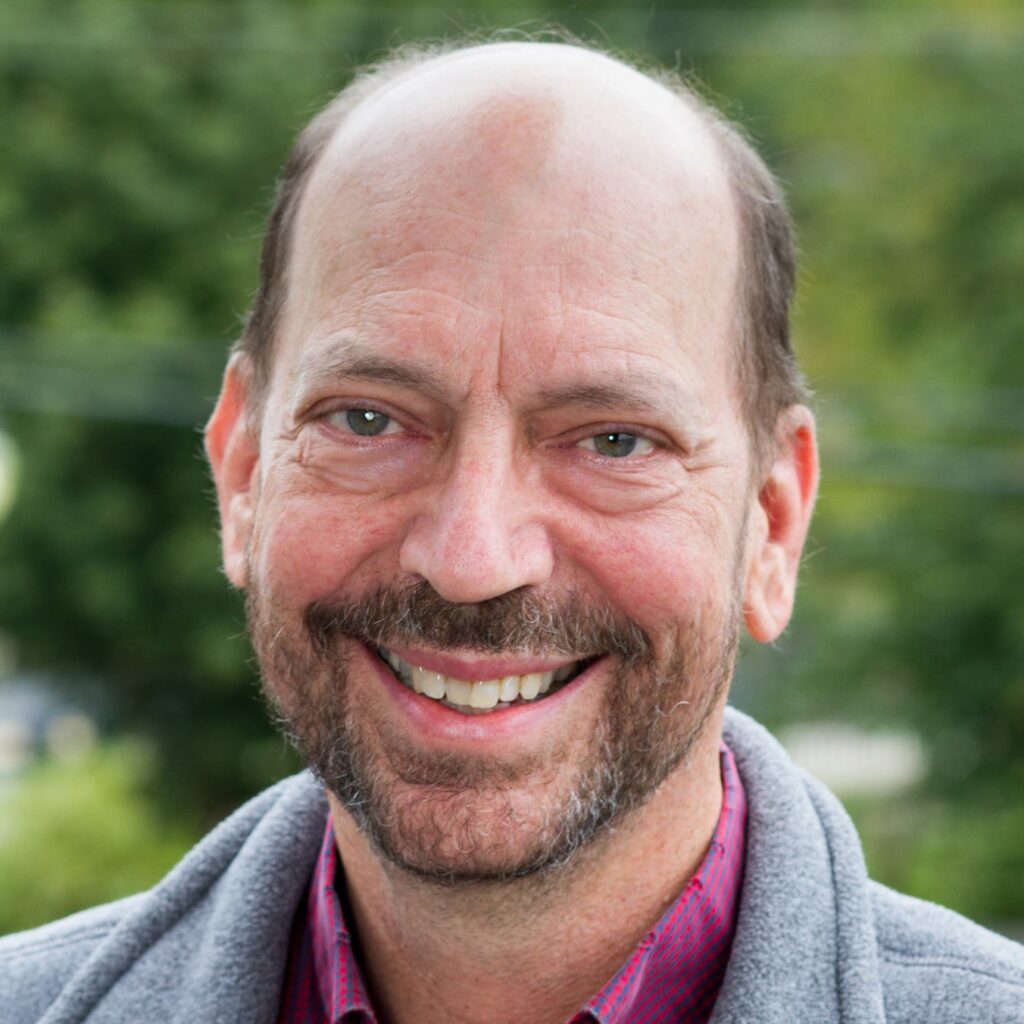
Mark Travis, NF ’03, who worked as a newspaper reporter, editor, publisher and book author, primarily in New Hampshire, died on Nov. 2, 2024, in Boston. He was 67 and valued by many colleagues for his kindness and skill in mentoring others. After graduating from Brown University in 1980, Travis reported briefly for the Concord Monitor before joining the Valley News in nearby Lebanon, N.H., as a reporter and editor. Three years later, he moved to the St. Petersburg Times as a reporter and then bureau chief. In 1986, Travis returned to the Concord Monitor, where he worked in roles that included reporter, editor, circulation director and director of product development. He also served as publisher of the Monitor and the Valley News. He co-wrote his first book, “My Brave Boys,” a New Hampshire Civil War history, with his friend and longtime editor of the Concord Monitor Mike Pride, NF’ 85.
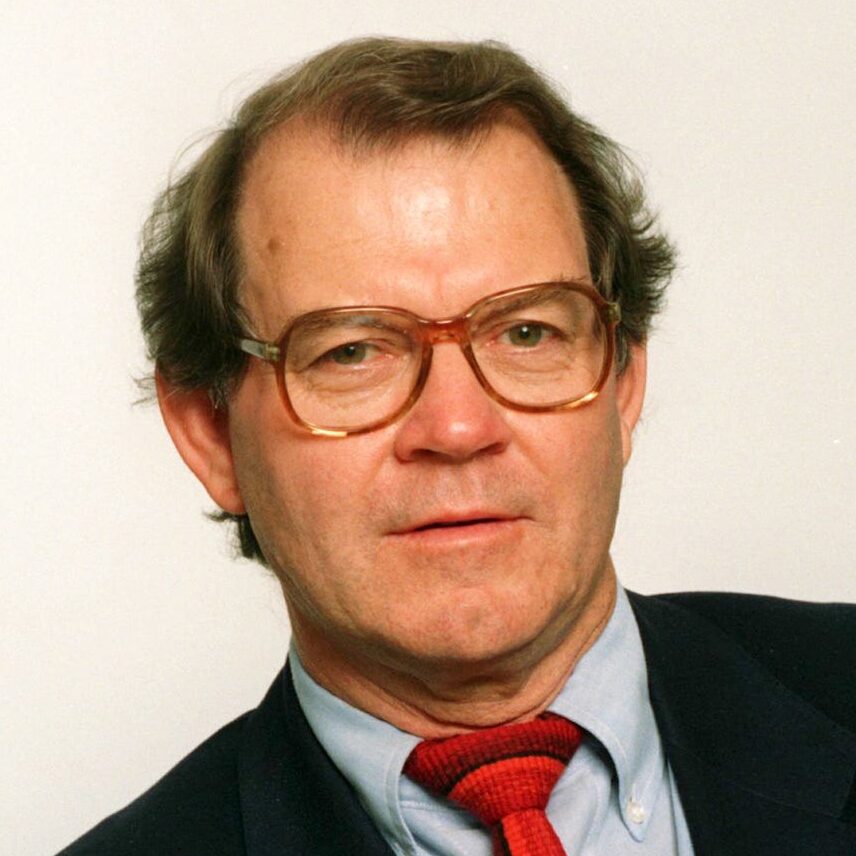
Remer Tyson, NF ’67, a reporter who covered politics for The Atlanta Constitution and the Detroit Free Press and chronicled wars, famine and freedom movements in Africa, died at his home in Harare, Zimbabwe, on Dec. 27, 2023. He was 89. In an appreciation written for the Nieman Foundation, friend and colleague Bill Schiller, NF ’06, noted: “Tyson was revered among foreign correspondents for the depth and breadth of his coverage, as well as for his generosity and mentorship of younger journalists. He filed dispatches from more than 40 countries, from Mali to Madagascar, and from Egypt to South Africa. Some were from the sharp edge of breaking events, like the battle of Mogadishu and the Rwandan genocide. But he also dedicated years to covering developing stories, like Namibia’s independence and Nelson Mandela’s heroic struggle to win his freedom.”
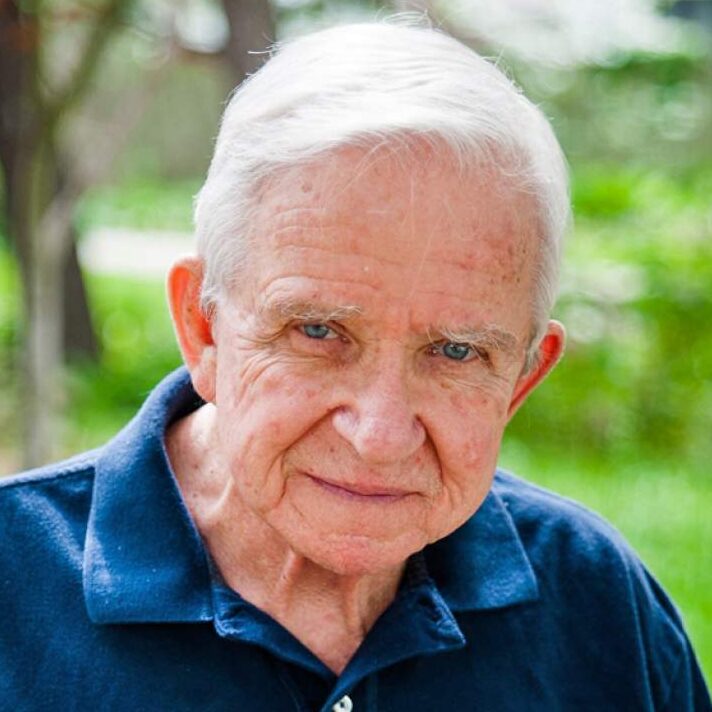
Dan Wakefield, NF ’64, a prolific journalist, novelist, essayist and screenwriter, died March 13, 2024, in Miami, Florida. He was 91. He worked as a writer and editor for national publications including The Nation, The Atlantic Monthly, GQ, Harper’s and The New York Times Magazine, authored novels and nonfiction books and taught and lectured widely. As a 23-year-old, he covered the trial of the two men accused of murdering Black teenager Emmett Till in Mississippi in 1955 and wrote about the systemic racism that led to their acquittal. His novels “Going All The Way” and “Starting Over” were adapted as feature films and a documentary film based on his memoir, “New York in the Fifties,” was produced in 2001. He also created the NBC prime-time TV series “James at 15.” In a 2013 Nieman Reports article, Wakefield recalled first meeting writer and fellow Indianan Kurt Vonnegut during his Nieman year.
Nieman Programming
A diverse roster of guests comes to Lippmann House each year to participate in Nieman seminars, shop talks and workshops. They share their research, expertise and insights on a broad range of topics and take part in informative discussions with the Nieman Fellows. The fellows also organize a number of more informal gatherings known as DIYs. Fellows in the classes of 2024 and 2025 took turns moderating and hosting many of the talks.
Seminars and Shop Talks
Spring 2024
Martha Minow, 300th Anniversary University Professor, former dean of Harvard Law School and author of “Saving the News: Why the Constitution Calls for Government Action to Preserve Freedom of Speech," met with Nieman Curator Ann Marie Lipinski and the Nieman Fellows and made the case for a more robust government policy to strengthen journalism. As board chair at the MacArthur Foundation, she also discussed the organization’s work on a consortium that pledged $500 million over the next five years to support Press Forward, a national initiative to fortify local news.
Paul Salopek, a Pulitzer Prize-winning journalist and 2012 Nieman Visiting Fellow, joined fellows via Zoom to provide an update on his Out of Eden Walk, the multiyear reporting project that is taking him around the world on foot. Already 11 years into the walk that began in Ethiopia and is tracing the path of human migration, Salopek spoke about his plans to wrap up the Asia leg of his journey and cross into the Americas. Austrian environment and investigative journalist Denise Hruby moderated.
Nieman Advisory Board members Wendi Thomas, NF ’16, and David Skok, NF ’12, spoke to fellows about what it took to launch their independent newsrooms. Thomas is the founding editor of MLK50: Justice Through Journalism, which grew from a one-year project to an award-winning newsroom based in Memphis, Tenn. Skok founded The Logic, one of Canada’s leading sources of business and technology news, in 2018.
Randall Kennedy, Michael R. Klein Professor at Harvard Law School, offered insights about speech, race and recent leadership changes on Harvard’s campus. Reporter and 2024 Nieman Fellow Ilya Marritz moderated.
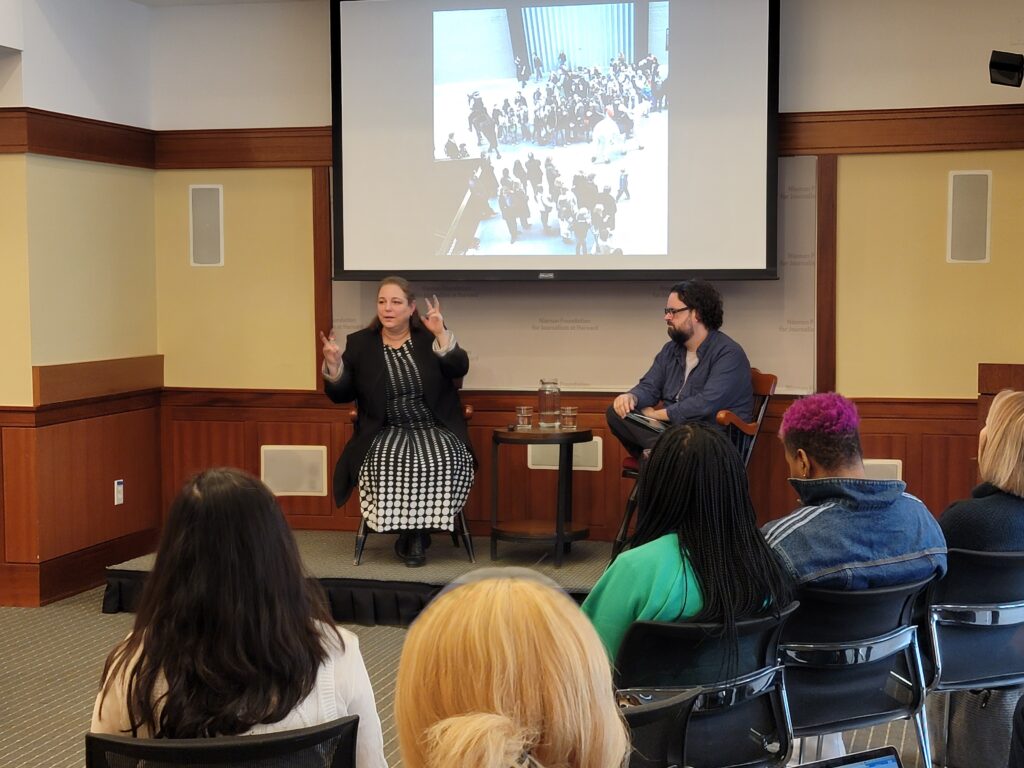
Cuban installation and performance artist Tania Bruguera, a senior lecturer and affiliate in Harvard’s department of Art, Film and Visual Studies, discussed her work examining the social effects of political and economic power and her collaborations with other artists. 2024 Nieman Fellow Javier Lafuente, deputy managing editor of the American edition of the Spanish newspaper El País, moderated.
S. Mitra Kalita, co-founder of URL Media and Epicenter-NYC and a 2021 Visiting Nieman Fellow, discussed her pivot away from executive-level positions in mainstream media to focus on building a newsroom from the ground up for her local community. Johanna Wild, an open-source researcher at the investigative nonprofit Bellingcat in Amsterdam, moderated.
Tonya Mosley, co-host of NPR’s “Fresh Air” and the host of the “Truth Be Told” podcast, talked about the launch of her new podcast “She Has a Name,” which blends investigative journalism and memoir to tell the story of a young Detroit mother lost amid that city’s economic collapse and crack cocaine epidemic. Beandrea July, an arts and culture journalist, film critic and audio producer, moderated.
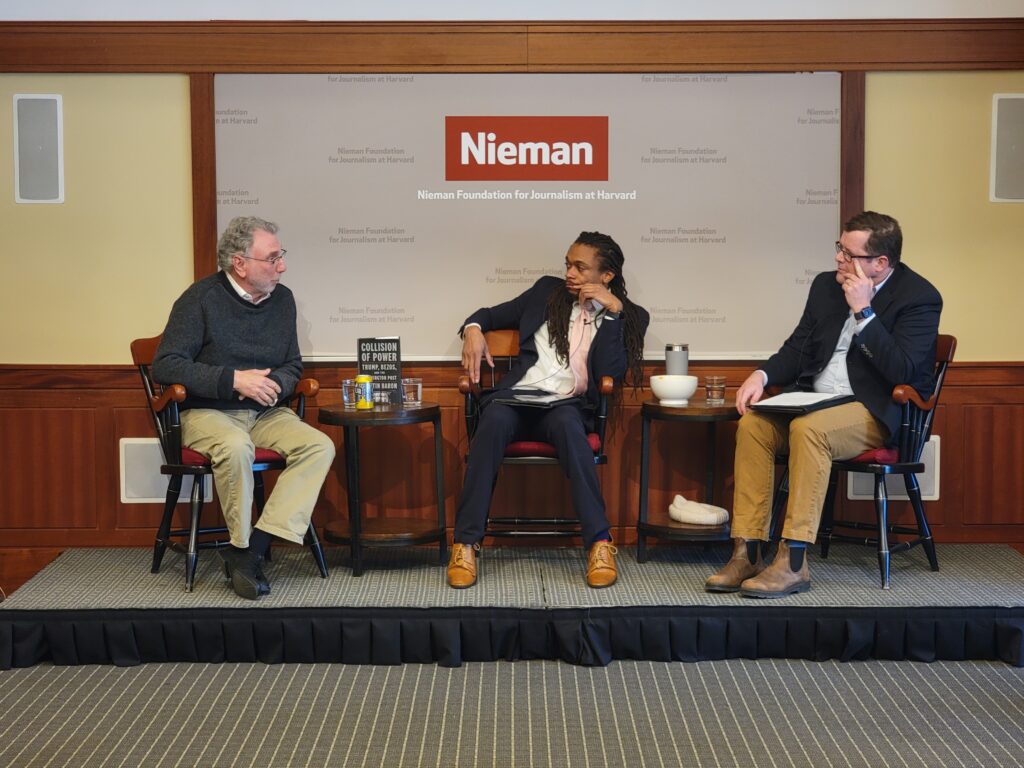
Marty Baron spoke with Boston Globe reporters Andrew Ryan and Julian Benbow and the 2024 Nieman Fellows about the media debate over journalistic objectivity, his time as editor of The Boston Globe and The Washington Post, and his memoir, “Collision of Power: Trump, Bezos, and The Washington Post.”
Raney Aronson-Rath, executive producer of “PBS Frontline,” spoke with moderator Denise Schrier Cetta, a producer and writer for “60 Minutes,” about Frontline’s recent Academy Award win for the gripping documentary “20 Days in Mariupol,” collaborating with media partners and adapting “Frontline” to new formats.
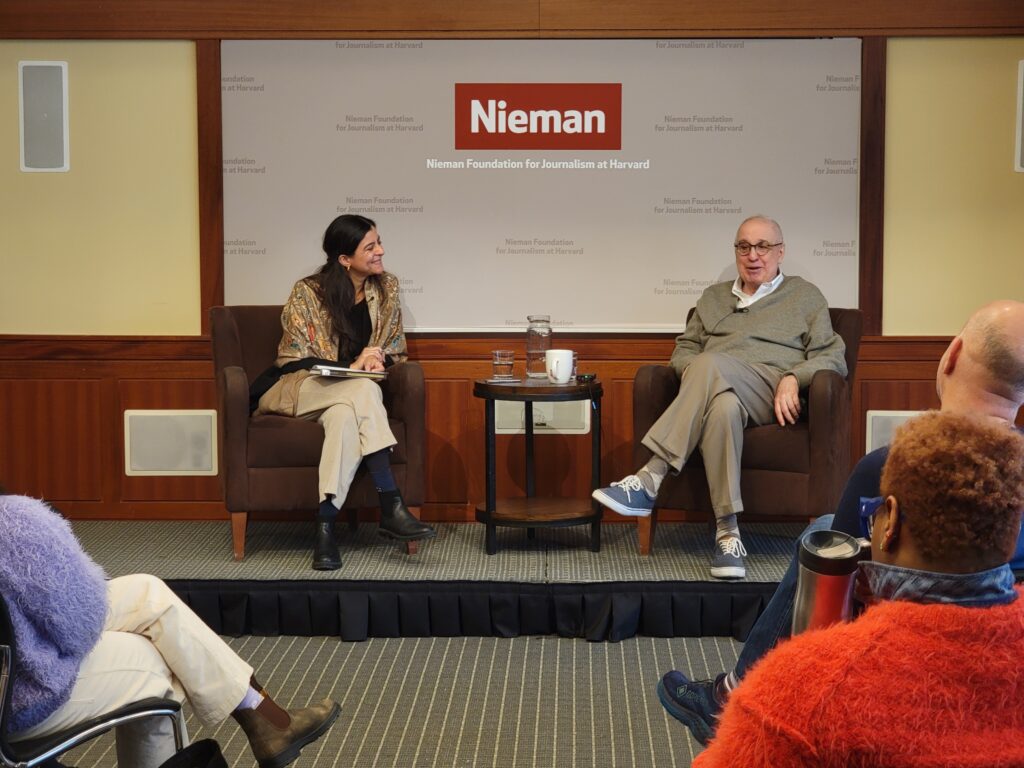
Filmmaker Errol Morris screened his documentary, “Separated,” an examination of the separation of parents and children at the U.S.-Mexico border, and spoke with the Nieman Fellows and moderator Andrea Patiño Contreras, a Colombian video journalist and editor based in Boston about his approach to storytelling.
Harvard Business School professor Bharat Anand, Vice Provost for Advances in Learning at Harvard, gave a presentation on digital strategy and the media and discussed findings from his book “The Content Trap: A Strategist’s Guide to Digital Change.”
Masha Gessen, NF ’04, author and a professor at the Craig Newmark Graduate School of Journalism at the City University of New York, and Ilia Veniavkin, a historian, civic engineer, and journalist, spoke with Nieman Fellow Sonya Groysman, a Russian reporter and video documentary director, about the Russian Independent Media Archive and resistance to media censorship in Russia. Gessen and Veniavkin co-founded the archive, a joint initiative by Bard College and PEN America that aims to resist censorship pressure and preserve the legacy of Russian independent journalism. The project is developing a toolkit for protecting and preserving material produced by newsrooms everywhere that have been closed or taken off the web.
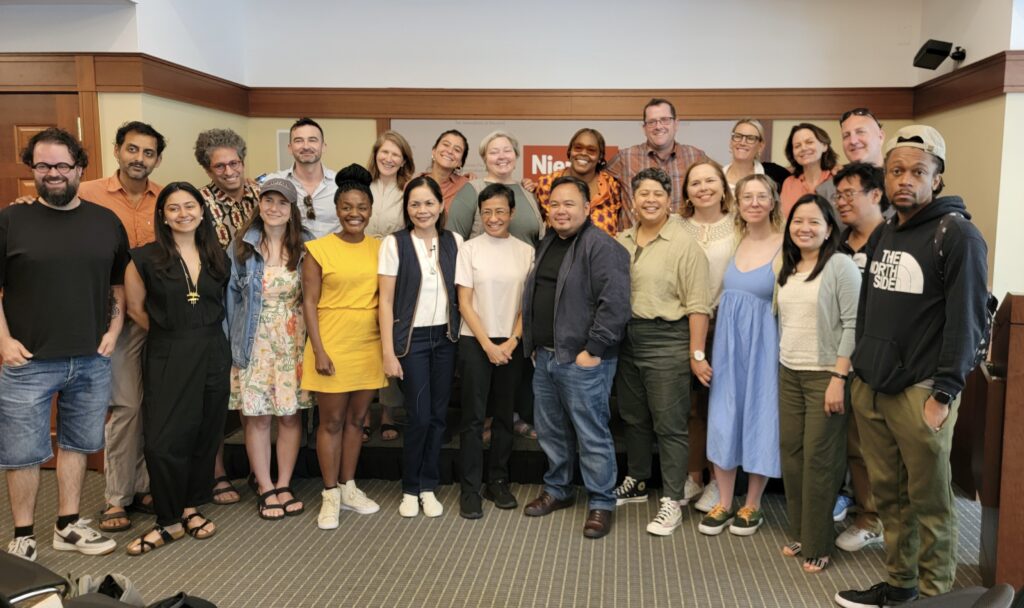
Maria Ressa, Nobel Peace Prize winner and co-founder and CEO of the Filipino news website Rappler, and Rappler co-founder and executive editor Glenda Gloria, NF ’18, spoke to the fellows in May about standing up to dictators, big tech, and their experience running a newsroom in the face of government threats and misinformation campaigns aided by technology. Jaemark Tordecilla, NF ’24, a fellow Filipino journalist, moderated. Ressa was in Cambridge to deliver Harvard’s 2024 commencement address, which can be viewed online. The full transcript of her Harvard speech is available on the Rappler site.
Fall 2024
Our fall seminar series began with Steven Levitsky, co-author with Daniel Ziblatt of “How Democracies Die” and “Tyranny of the Minority: Why American Democracy Reached the Breaking Point.” He spoke with Nieman Curator Ann Marie Lipinski about the evolving state of global democratic values. Levitsky, director of the David Rockefeller Center for Latin American Studies, discussed how the emergence of a multiracial democracy in the U.S. has threatened those who traditionally controlled political power and led some to defy democratic norms.
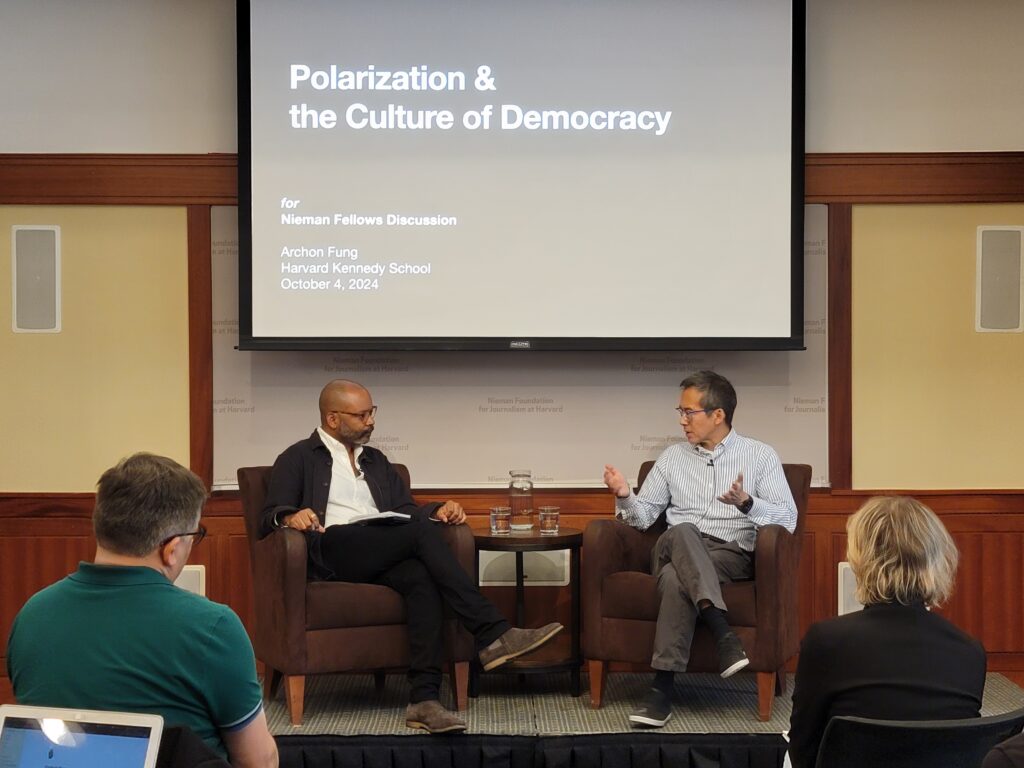
Archon Fung, director of the Ash Center for Democratic Governance and Innovation and the Winthrop Laflin McCormack Professor of Citizenship and Self-Government at Harvard Kennedy School, presented his research on “Polarization and the Culture of Democracy.” He spoke with the fellows and moderator Tyrone Beason, a staff writer at the Los Angeles Times, about why so many find it difficult to compromise on their core beliefs. Excerpts from his talk are now available in Nieman Reports.
Martha Minow, 300th Anniversary University Professor, former dean of Harvard Law School and author of “Saving the News: Why the Constitution Calls for Government Action to Preserve Freedom of Speech,” shared a number of possible solutions for saving journalism. Speaking with moderator Gina Smith, investigations and projects editor for McClatchy’s South Carolina newspapers, and her Nieman classmates, Minow discussed the importance of media literacy; the need to protect consumers by unbundling content, opening up competition and regulating fake content; and the necessity of treating internet platforms as corporate entities that pay taxes and pay for intellectual property.
David Sanger, White House and national security correspondent for The New York Times and a Kennedy School lecturer, met with the fellows three days after the U.S. presidential election in November. He answered questions from moderator Benjamin Bidder, a business reporter for Der Spiegel who covers Russia and Ukraine, about what he has learned from covering the president-elect and how Trump’s policies are likely to affect domestic and global events.
Nieman Fellow David Herszenhorn, the Russia, Ukraine, East Europe editor at The Washington Post, invited Peter Baker, chief White House correspondent for The New York Times, and Susan Glasser, a staff writer with The New Yorker, to analyze the factors that led to the election outcome and the role that news coverage — and the lack of news consumption — may have played in swaying voters.
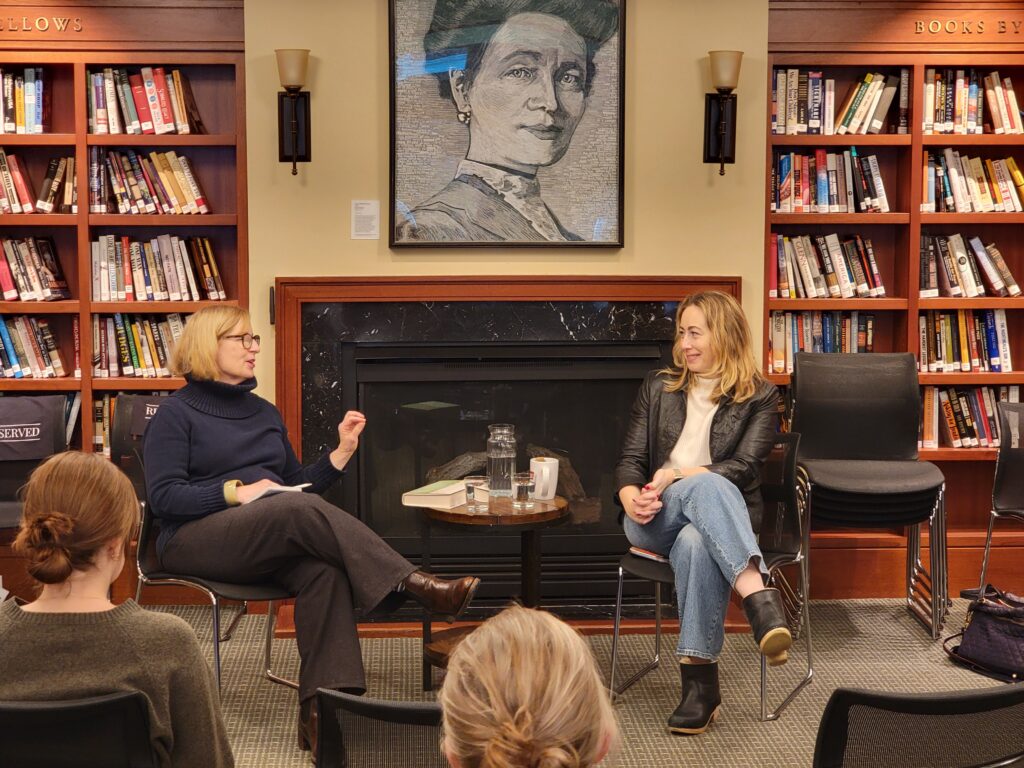
Lisa Lerer, NF ’18, national political correspondent for The New York Times, spoke with Nieman Curator Ann Marie Lipinski about what she learned on the campaign trail, the toll political journalism takes on reporters and what she and colleagues are preparing for in the coming four years during the Trump administration.
Randall Kennedy, Michael R. Klein Professor at Harvard Law School, spoke with moderator Jon Collins, a senior reporter at MPR News in Minneapolis, about a wide variety of topics including turmoil at Harvard during the past year; freedom of speech and protests on campus; police misconduct; the transformation of the U.S. Supreme Court; and the legacy of former Supreme Court Justice Thurgood Marshall.
Filmmaker Errol Morris joined the fellows and moderator Bianca Giaever, an independent radio journalist and filmmaker, for a wide-ranging discussion about his work, his new project in Ukraine, war crimes that go unpunished, the cruelty of the Trump administration’s policy of separating immigrant children from their families on the U.S. border (and the renewed importance of his film “Separated”) and the significance of bearing witness to events that can’t be controlled.
Nieman DIYs
DIYs, informal talks arranged and hosted by the Nieman Fellows, covered many different topics during the past year.
Beandrea July invited Stephanie Goodman, the film and comedy editor at The New York Times, to speak with the fellows about her work and how to be an effective editor.
Ilya Marritz hosted a talk with author Alysia Abbott, who spoke about “Fairyland: A Memoir of My Father.” She began writing the bestselling book during her time as a 2010 Nieman affiliate.
The filmmakers of “Bad Press,” recipient of the 2023 Sundance Film Festival’s U.S. Documentary Special Jury Award for Freedom of Expression, visited Lippmann House to discuss their work and the role of Mvskoke Media, a company that distributes information to the Mvskoke people through various channels, in fighting to preserve a free press. Guests were Angel Ellis, a journalist of the Muscogee Nation and protagonist of the film, and the film’s director, Joe Peeler.
Premesh Chandran, the co-founder and former CEO of Malaysiakini, Malaysia’s most popular independent news website, spoke with Nieman Fellow Annie Jieping Zhang, founder and CEO of Matters Lab located in Hong Kong and Taiwan, about building a mission-based media ecosystem. Chandran has joined the Media Development Investment Fund (MDIF) team as senior advisor to the CEO.
Bill Siemering, a founding member of NPR’s board of directors and author of the network’s original mission, spoke with moderator Julia Barton about his long career in public radio. Siemering led the development of “All Things Considered” as NPR’s first director of programming. He is also founder of the NGO Developing Radio Partners.
Jikyung Kim invited Lobsang Sangay, a Senior Visiting Fellow at Harvard Law School’s East Asian Legal Studies Program and former president of the of the Central Tibetan Administration, to discuss Tibet, the international politics surrounding it, and the future of China’s foreign relations. Sangay wrote the Foreign Affairs article “Reincarnation, The Battle for the Soul of the Dalai Lama.”
Andrea Patiño Contreras hosted 2023 Nieman Visiting Fellow Rebecca Richman Cohen, a filmmaker and lecturer at Harvard Law School, who screened and discussed “The Recall,” her documentary examining the 2018 recall of California Judge Aaron Persky.
Philippe Sands, a visiting professor of law at Harvard Law School and a professor of law at University College London, discussed his overlapping careers as an international human rights lawyer, author, historian and playwright, and how to craft compelling narratives out of challenging material. Among his many roles, Sands has been representing Palestine before the International Court of Justice. Nieman Fellows Yana Lyushnevskaya and Ilya Marritz led the discussion.
Katrin Bennhold, NF ’13, Berlin bureau chief for The New York Times, spoke with moderators Ilya Marritz and Denise Hruby about her post-Nieman career, her “Day X” podcast on the far-right’s infiltration of Germany’s security services, “The Battle for Europe,” an audio series from “The Daily” about nationalism and populism in Europe, and how she gained new perspectives on her native Germany after living abroad for many years.
David McGraw, a lecturer at Harvard Law School, spoke with Julia Barton and Yana Lyushnevskaya about his work at The New York Times, where he serves as the newsroom’s top attorney. He has been the Times’ principal legal advisor on some of the newspaper’s most complex stories, including the WikiLeaks and Snowden disclosures, the #MeToo movement investigations, Donald Trump’s taxes and the secret fortunes of China’s political elites.
Denise Hruby, an Austrian environment and investigative journalist, taught a workshop for her Nieman classmates on covering climate change. Hruby also moderated “Climate in the Newsroom: An Inside Look,” a panel discussion that took place during Harvard Climate Action Week, hosted by the Climate Action Accelerator at Harvard’s Salata Institute for Climate and Sustainability. The panel featured Tristan Ahtone, NF ’18, editor-at-large at Grist and three other leading climate editors.
Nieman Fellow Rachel Pulfer, executive director of Journalists for Human Rights in Toronto, spoke with Brittany Butler, executive director of the Social Innovation and Change Initiative at Harvard Kennedy School, about Butler’s work, the world of nonprofits and social philanthropy. Pulfer also hosted a session for her classmates on the art and science of fundraising.
Jon Collins, NF ’25, a senior reporter for MPR News in Minneapolis, invited Louisa Thomas to meet with the class to discuss her work and the future of longform journalism. A visiting lecturer on English at Harvard, Thomas is the author of three books and a staff writer for The New Yorker.
Visiting Nieman Fellow Sally Buzbee invited David Scott, VP and head of news strategy and operations at The Associated Press, to join fellows on Zoom to discuss AP’s role in election winner projections. Buzbee moderated a separate Shorenstein Center webinar, “Making the call: How the AP calls election results,” that featured Scott and several other election-coverage experts.
Edward Wong, NF ’18, diplomatic correspondent for The New York Times, spoke with Nieman Fellow Mike Shum, a filmmaker who works for news outlets including “PBS Frontline,” about his book, “At the Edge of Empire: A Family’s Reckoning with China,” a personal memoir of Wong’s family, which he started during his Nieman year.
Mark MacGann, a fellow at the Public Interest Tech Lab at the Harvard Kennedy School’s Shorenstein Center, spoke with Sandrine Rigaud, former editor-in-chief of Forbidden Stories, about his experience working with investigative journalists as the whistleblower behind the Uber Files. He advocates for greater transparency in lobbying and stronger social protections for the millions of gig workers in the economy.
Jon Collins invited British journalist and author Sophia Smith Galer to speak to the fellows about her career path, which has taken her from working for the BBC and Vice News to becoming an independent journalist. She has successfully used social media, including TikTok and Instagram, to reach a younger audience with her work.
Workshops, Trainings and Trips
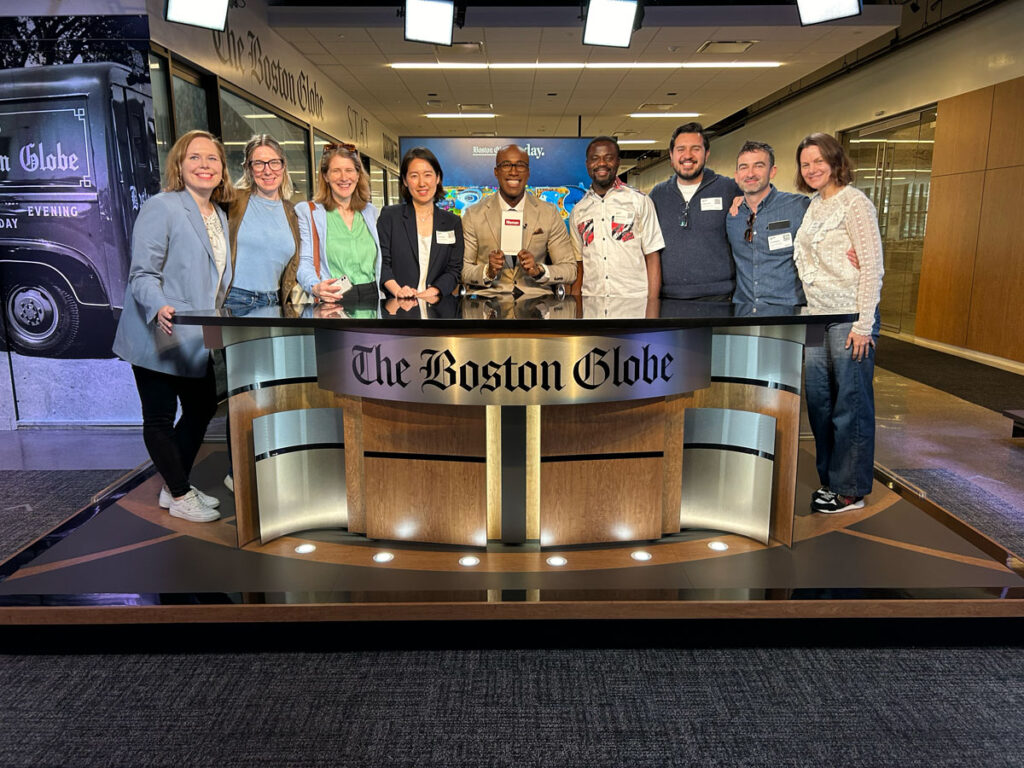
The 2024 Nieman Fellows visited The Boston Globe, where they attended the morning news meeting, toured the newsroom and TV studio and met with globe staffers including Nieman alumni Anica Butler, NF ’19, deputy managing editor for local news; Jeneé Osterheldt, NF ’17, deputy managing editor for culture, talent and development; and Helen Branswell, NF ’11, senior writer covering infectious diseases for Stat News.
In April, Jaemark Tordecilla led an AI workshop for his classmates, demonstrating a range of ways that emerging AI technologies and tools can be used in newsrooms now. He also discussed the ethical and legal considerations surrounding their use and shared the custom AI tool he developed to aid in-depth reporting.
Together with the Shorenstein Center for Media, Politics, and Public Policy, Nieman co-sponsored an exhibit of photos by Anja Niedringhaus, NF ’07, ten years after she was killed while reporting in Afghanistan. Curated by Anja’s longtime friend and colleague Kathy Gannon, along with Ami Beckmann and Muhammed Muheisen, the exhibition opened with a reception at the Kennedy School in May.
In the spring, Harvard Law School lecturer Debbie Heller Goldstein ran a daylong negotiation workshop for the fellows. She is a principal and the managing director of Triad Consulting, an organization focused on helping people resolve disputes and make difficult decisions.
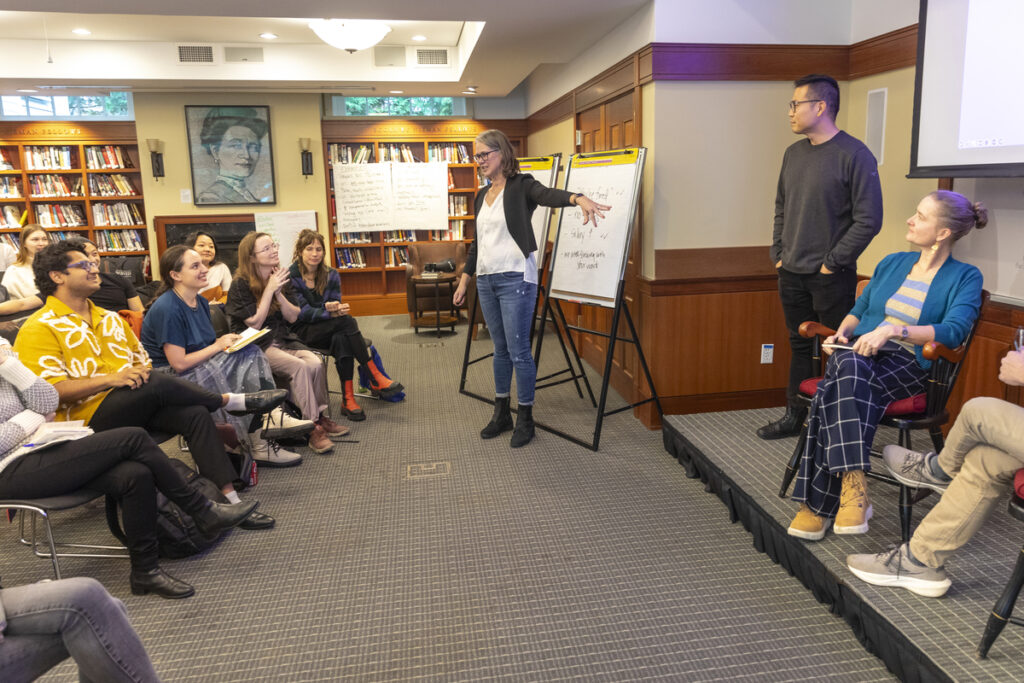
In the fall, Sheila Heen, a Harvard Law School professor and deputy director of the Harvard Negotiation Project, led a lively workshop on navigating difficult discussions. She outlined useful ways to approach challenging topics and how to identify and manage the internal thoughts that drive so many of our interactions.
The 2025 Nieman Fellows attended the American Repertory Theater’s new production of “Romeo and Juliet” and met with the A.R.T.’s artistic director, Diane Paulus, and dramaturg Ryan McKittrick before the show to learn more about their staging of the play and the unique aspects of theatrical storytelling.
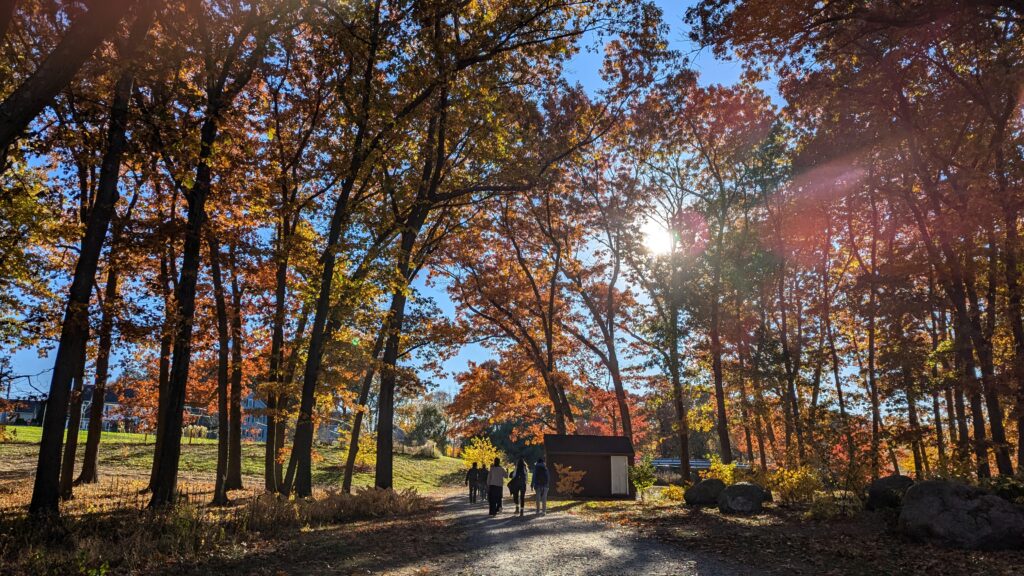
The class of 2025 also toured Harvard’s Arnold Arboretum, a 281-acre preserve in the heart of Boston designed by Frederick Law Olmsted, and met with director Ned Friedman.
Brian Mandell, senior lecturer in Public Policy, director of the Negotiation and Conflict Resolution Collaboratory, and chair of the Wexner Senior Leadership Program at Harvard Kennedy School, led a daylong negotiation workshop for the fellows.
